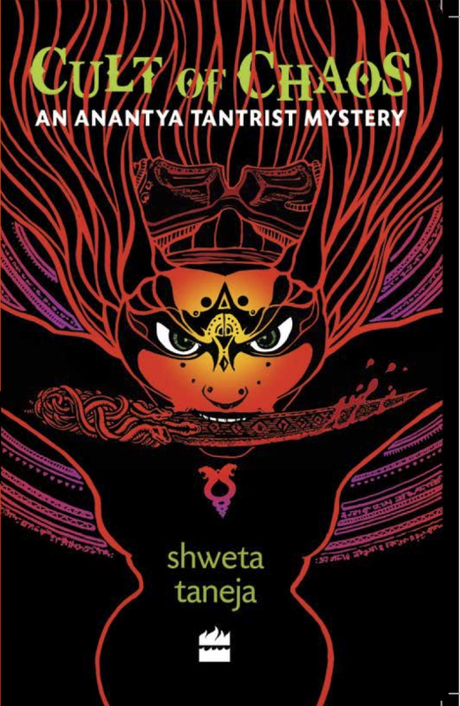I have a special writer friend over today with a guest post. Shweta Taneja. She's the author of the rather mesmerizing book "Cult of Chaos". I connected with her over a month ago...maybe more...and was delighted when she offered to write here. Right now, I am absorbed in her book and will be posting a review soon. I had actually planned to read it next week - but I made the cardinal mistake of "let me just read a couple of pages" and now I am sucked into the plot. What can I say? She's a stunning writer and I am loving it so far.
Let's welcome Shweta Taneja.
 First, a brief bio.
First, a brief bio. Shweta Taneja is an author with a weakness for the occult, the eccentric and the oral traditions of Indian mythology. Her latest book Cult of Chaos is a tantrik detective fantasy based in Delhi. More about her at www.shwetawrites.com or @shwetawrites
Her latest book is Cult of Chaos, an Anantya Tantrist mystery

Anantya Tantrist is a spunky 23-year-old, gaali-spewing, beedi-smoking fearless tantrik who solves crimes in Delhi. When she's not solving crime, she's having a drink at Bedardi Bar. Cult of Chaos is the first of her dark adventures where she solves a case in which little girls are being sacrificed in a tantrik ritual. More here.
(Note: gaali is profanity and beedi is a desi cigarette in Hindi)And here she is with a rather apt and timely topic - writing and procrastination. The girl can read my mind I say! So take it away, Shweta! (Pushing the crisp dosa and its accessories and coffee towards you...)
Five writing procrastinations and how to strike them down
Writers are natural born procrastinators. We all know that feeling, the one which comes just before you actually start to write: Let me have another cup of tea, another day, another book, another little salty chip and then I will start. When I began my journalist career more than a decade ago, I was sure I couldn't write an article. It took me five years of wanting to write fiction, a Master's degree, two failed novels and millions of procrastinating moments to finally do something that all blogs, all writers keep suggesting: write. After a year of stalling, I started to write fiction and once I did, I couldn't stop. In the last five years, I've written six books, four of which are published and two lie at various edit levels. The longest of this, my latest Cult of Chaos, touched 1,20,000 words at manuscript stage. Here I list down a few of these lovely time-sinks and how to get rid of them.
I tried yesterday, I couldn't write a word. I have writer's block.
No, you don't. A writer's block is a myth, created by star-struck media or lazy writers. There's nothing like it out there. Yes, there would be some days when you stare at the screen, your hands spread over the keyboard and nothing sensible will come. When you know you have to delete every single word you've written. But it's these 'blocked' days that will lead to a glorious day when your fingers are flying over the keys. The day you can't write always leads to the day you do. Keep writing nonsense if you can't make it sensible, but write. Start by putting one word after the other.
I can't write in this noise
Have you seen a baby pop off into dreamland in the middle of a party? Become that. Let nothing physical - noises, voices, areas, homes, cafes or offices - take you away from your writing. Don't think you can write only in certain conditions. You can write all the time, everywhere. All you need is discipline and focus. Try and write everywhere you go for a month. That's all it takes to develop the habit.
I need a better grasp at language
I was convinced about this for the longest time (the time spent in thinking about writing and not writing itself). Then one day, when I voiced this to a friend of mine, she told me to consult a thesaurus or a dictionary. You are not writing grammar, you are writing stories. Concentrate on expression, the story you've decided to tell, through the limited language you have in your grasp. Writing in a language improves your skill in that language, your spelling, your grammar. You will see the difference yourself. Another way to improve in the language is to read other authors, see how they express things, how they use mere words to touch a core in you. Read and learn.
I want to, but just don't have time to write
Do you take a shower everyday? Eat everyday? If writing the story in your head is not as essential to you as sleep and food is, you will never write. It's like the retirement dream of living on a beach that all of us have. If you want to live on the beach, why not start now? Why wait till you get old and tired? So write. Now. Take out the time. Even 20 minutes per day should do. People complete novels in that time.
I need special software to plot my book
Nope, you need nothing but yourself, a pen and little bits of paper. Or a laptop and a clean document screen. Everything else, the iPad, the app which costs $25 and helps you figure out your plot and characters, internet, everything else is a waste of time and keeps you away from writing. Don't manage the tools of writing, instead - write.
Missed any of those niggles? Add them in the comments below and we'll figure out how to slash them for you.
♥
Thank you Shweta! Dear friends - we'd love to hear your thoughts on writing and procrastination
